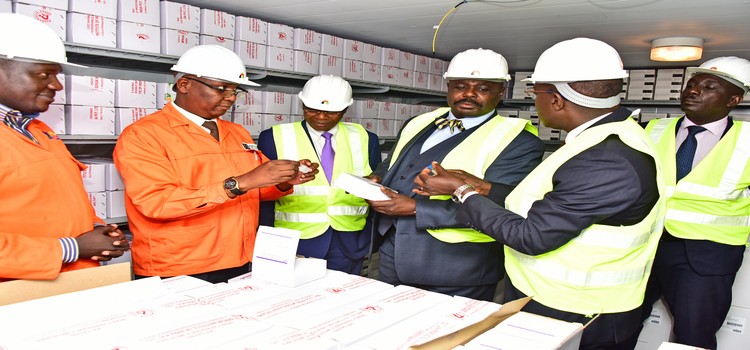 The Deputy Speaker of Parliament, Jacob Oulanyah, has commended the management of the National Medical Stores (NMS) for performing above its expectations and meeting its targets.
The Deputy Speaker of Parliament, Jacob Oulanyah, has commended the management of the National Medical Stores (NMS) for performing above its expectations and meeting its targets.
Oulanyah said that NMS has gone on to demystify the fact that national systems can operate efficiently.
He made the remarks during his tour of the facility on Tuesday, 16 October 2018 in Entebbe.
“This country has received a lot of bad news and therefore, good news is necessary which is what we have from NMS. We need more stories of hope like these so that our people can be inspired to do better,” Oulanyah said.
He said such success stories should be shared so that people can have faith that systems can work fluidly in this country.
Oulanyah made the comments following a presentation to him by the General Manager, Moses Kamabare, about the achievements of NMS.
Kamabare said that the institution had managed to lower its service charges from 35 per cent to eight per cent; achieved at least six annual deliveries to all government health facilities; minimised late ordering; timely deliveries and provision of oral morphine among others.
“We are a week ahead in terms of deliveries to medical facilities; and we have not exceeded 0.2 per cent in expired stock of drugs, which makes us a model facility worldwide,” he said.
Kamabare said that previously, drugs were being delivered to the districts but they were not reaching the health facilities; so, they adopted the last-mile delivery system where drugs are delivered to the actual health facility, thereby eliminating delays.
“We have done quite a number of interventions to ease availability of drugs which includes working with Hospice Uganda to supply oral morphine to terminally ill patients free of charge, which is a first in Africa,” he noted.
He added that they have been able to increase the delivery of vaccines from 54 per cent to 92 per cent coverage of the country by integrating the procurement and handling of vaccines, “earning us the ‘Best in Africa’ title of coverage”.
The Deputy Speaker, however, wondered about the unavailability of drugs in some health facilities, to which Kamabare blamed on the district leadership and medical personnel.
“There is a tendency of people managing the supply of drugs to hoard them in order to create scarcity so that they can sell them off. Others steal the drugs and sell them to private facilities,” he added.
Kamabare also said the institution is faced with issues of money lost in foreign exchange because of purchases made in US dollars. He highlighted the problem of irrational prescriptions made by health workers that create unnecessary gaps in drug supply and limited storage space.
Oulanyah encouraged government institutions to adopt the pyramid of virtues as a concept for efficiency.
“In institutions, we start with the regulations, which form the basis of the institution; the personnel and their attitude; the efficiency of the equipment and the personnel in galvanized operations and finally efficacy, which means fitness of the institution,” he said.
Oulanyah urged NMS to target precise delivery of services which focuses on making sure that every individual can accesses drugs in the country.
